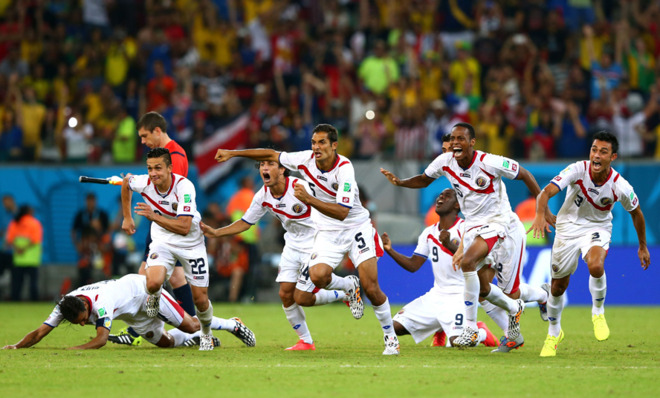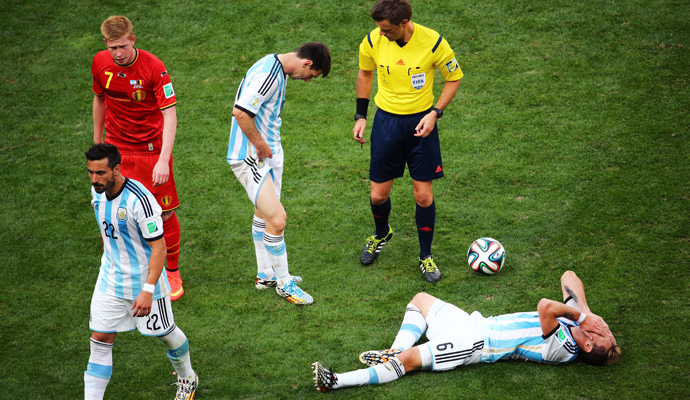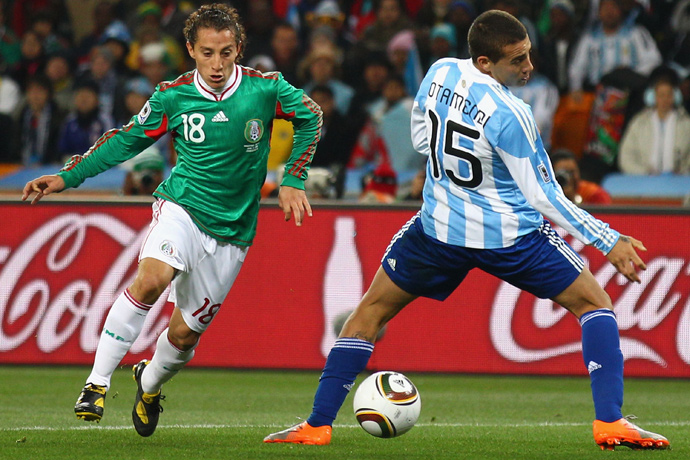Our 12 favorite World Cup words
Don't get nutmegged, or you might need the magic sponge

A free daily email with the biggest news stories of the day – and the best features from TheWeek.com
You are now subscribed
Your newsletter sign-up was successful

We wouldn't call ourselves rabid fans of soccer (or football, depending on your side of the Atlantic), but then that guy bit that other guy (and gave us Suarezing), the Colombia team danced after every goal, and Tim Howard made 16 record-breaking saves (and while he couldn't save the U.S. team, he did save the internet). Now we're hooked.
And we're celebrating the best way we know how: with words. Here are 12 of our favorites from the world of the World Cup.
1. corridor of uncertainty
The Week
Escape your echo chamber. Get the facts behind the news, plus analysis from multiple perspectives.

Sign up for The Week's Free Newsletters
From our morning news briefing to a weekly Good News Newsletter, get the best of The Week delivered directly to your inbox.
From our morning news briefing to a weekly Good News Newsletter, get the best of The Week delivered directly to your inbox.
The corridor of uncertainty is a pass delivered into the area between the goalkeeper and the last line of defense. The phrase originates from cricket and refers to "an area where a cricket ball can pitch during a delivery" and where "a batsman struggles most to determine whether to play forward or back, or whether to leave the delivery."
According to the Oxford English Dictionary (OED), corridor of uncertainty, which seems to have originated in the mid-1980s, is particularly associated with English cricketer and commentator Geoffrey Boycott.
Example: "The Netherlands could not have gone much closer when a ball scythed along the corridor of uncertainty, somehow eluding two Dutch attackers and three Costa Rica defenders, only to fall to the feet of van Persie."
— Callum Hamilton, "Netherlands vs. Costa Rica: Final score 0-0, Dutch win on penalties after dramatic finale," SB Nation, July 5, 2014
A free daily email with the biggest news stories of the day – and the best features from TheWeek.com
2. dummy
To dummy in soccer means to deceive your opponent into thinking you're going to pass, shoot, or receive the ball, and then do something different. The OED says this term originated in the 1950s.
The meaning comes from the sense of dummy, "an imitation of a real or original object, intended to be used as a practical substitute," which perhaps comes from the bridge or whist term referring to "an imaginary player represented by an exposed 'hand', managed by and serving as partner to one of the players."
These senses seem to ultimately come from the original meaning of dummy, a dumb or mute person. The Old English dumb means "silent, unable to speak," and comes from the Proto-Indo-European dheubh-, "confusion, stupefaction, dizziness." Dheubh- originates from the root dheu-, "dust, mist, vapor, smoke," perhaps with the idea of "defective perception or wits," according to the Online Etymology Dictionary.
Example: "First, Thomas Muller managed to fall over as he attempted to dummy the ball, before Toni Kroos played in a shocking chip that was easily swept up by the Algerian defence."
— Hannah Duncan, "Thomas Muller 'fall' in German free-kick 'fail' was all a big ruse, reveals Benedikt Howedes," Metro, July 1, 2014
3. flopping

Flopping, also known as diving as well as simulation, if you're FIFA, means pretending to be fouled, and is usually evinced by exaggerated falling and howls of pain.
We couldn't find when the term flopping originated exactly. It also applies to basketball, and in 1963 Frank Ramsey described his "deceptive" techniques to Sports Illustrated, although he never calls it flopping. He says the most reliable "eye-catcher" is the pratfall. Perhaps flopping, with the idea of flopping over, comes from the these exaggerated falls.
Example: "The practice of the flop is a tried-and-true method of manipulating each game's referee to make calls go your way by aggressively exaggerating fouls or the appearance of fouls."
— Eric Levenson, "Dissecting American Soccer's Hatred of the Flop Is a World Cup Tradition," The Wire, June 16, 2014
4. giant-killing
Giant-killing refers to, in sports, "the defeat of a team by a much weaker opponent." The phrase may come from the story of David and Goliath, although the OED's earliest citations refer to "Jack the giant killer" and "giant-killing Jack" of Jack and the Beanstalk.
Example: "They now take on Greece, the runners up in Group C, in a round-of-16 match in the early hours of Monday morning and will be strongly fancied to continue their giant-killing run."
— Michael Lynch, "World Cup 2014: North and Central American region provides success stories of the tournament," The Sydney Morning Herald, June 28, 2014
5. group of death
A group of death is "a group in a multi-stage tournament which is unusually competitive, because the number of strong competitors in the group is greater than the number of qualifying places available for the next phase of the tournament."
This term may come from the Spanish grupo de la muerte, which was coined by Mexican journalists in 1970.
Example: "Advancing out of the Group of Death is significant, but playing in the second round of the World Cup is not."
— Mike Foss, "Just escaping the group of death isn't good enough for the U.S. at the World Cup anymore," USA Today, June 27, 2014
6. Kop

Kop, short for Spion Kop, refers to the stadium terraces "attended by hardcore fans, particularly in the United Kingdom." The original Spion Kop, which translates from Afrikaans as "spy hill," is a mountain in South Africa and the site of the Battle of Spion Kop, which was fought during the Second Boer War.
Sports stadium terraces may have first been referred to as Spion Kop in the early 1900s, shortly after the battle, which seems to pre-date the OED's citation of 1924.
Example: "A favourite of the Kop – the Liverpool faithful – Suarez enjoyed an ambivalent relationship with rest of the Premiership fans who slowly warmed to his goal-scoring abilities but never forgot his other escapades."
— Siddharth Saxena, "Fifa bites back: Suarez gets nine-match ban," The Times of India, June 27, 2014
7. lost the dressing room
The term lost the dressing room refers to when a sports team's "manager is deemed to have lost control and support of the players" and may soon get fired. The term may come from the idea that it's in the dressing or locker room that the manager raises his players' spirits.
Example: "Kiss' appointment was welcomed by the players – Rory Best said getting Kiss was 'brilliant for Ulster Rugby' – but amid talk Anscombe lost the dressing room, Kiss will have to breathe new life into the province."
— Tom Hamilton, "Ulster's knock-on effect on Ireland," ESPN Scrum, July 3, 2014
8. magic sponge
The magic sponge is a seemingly ordinary sponge that has a miraculous "reviving effect on injured players." The OED says it originated around 1961:
"Consider what is said of players and 'the magic sponge'. Of how they are supposed to go down on the slightest pretense and, with scarcely a squeeze from the sponge, continue playing vigorously within a matter of seconds."
Example: "Kicking a football [on Jupiter] would be like kicking a lump of concrete. More than the magic sponge would be needed to sort out that injury."
— Stuart Clark, "Across the Universe," The Guardian, June 11, 2014
9. nutmeg

The nutmeg is a technique used in "soccer, field hockey or basketball, in which a player rolls or throws the ball through an opponent's legs." The OED's earliest citation is from 1968:
Three times I pushed the ball between the legs of the same full-back. This is the worst thing a forward can do to a defender because it makes him look foolish; and if, as I did, the forward then shouts 'Nut Meg' (the traditional taunt) the defender's ego takes a sharp knock.
It's not clear why this maneuver is called the nutmeg. Wikipedia offers a few theories: that it comes from slang meaning of nutmeg as "testicles"; that nutmeg is Cockney rhyming slang for leg; and that nutmeg at one point came to mean duping someone because nutmegs "were such a valuable commodity that unscrupulous exporters were to pull a fast one by mixing a helping of wooden replicas into the sacks being shipped to England."
Example: "Higuain had poked the ball through his legs to set up the shooting chance. Ouch! That's called 'a nutmeg in soccer.'"
— Don Cuddy, "On the World Cup: Costa Rica Nearly Pulls off Historic Upset," South Coast Today, July 6, 2014
10. rabona
A rabona is "a method of kicking the football whereby the kicking leg is wrapped around the back of the standing leg." (Not clear on what that means? This compilation might help.)
Apparently the first to perform the rabona was Argentina's Ricardo Infante in 1948, and the Argentinian magazine, El Grafico, was the first to come up with the term. Their cover showed Infante (which means "infant" in Spanish) "dressed as a pupil with the caption 'Infante played hooky,'" where rabona means to play hooky or skip school.
Example: "Then, with no-one around him and time to pick out a man, he went for an unnecessary, extravagant rabona pass."
— Sam Cunningham, "Angel Di Maria played one of the worst match-winning performances in history," The Daily Mail, July 2, 2014
11. tifo
A tifo is "a form of choreography displayed by supporters on the terraces of an arena or stadium, where they make a large-scale pattern or picture by holding up, or wearing, various materials."
The tifo originated in Italy and Southern Europe, and is a shortened form of tifosi, Italian for "fans." See also Ultras.
Example: "Tifos are sort of a continental European thing — you'll especially see the Italians throwing up large choreographed displays to show their support for their teams."
— Kathy Willens, "Where is Soccer City, USA?" Kens5.com, June 16, 2014
12. tiki-taka
Tiki-taka is soccer style "characterized by short passing and movement, working the ball through various channels, and maintaining possession." The word tiki-taka is imitative and may translate as "touch-touch" in Spanish.
While the term was already in colloquial use in Spanish football, perhaps originating with retired midfielder Javier Clement, Spanish broadcaster Spanish broadcaster Andrés Montes is credited with coining and popularizing the phrase.
Example: "In its six years of global supremacy, [the Spanish team] perfected an innovative way of playing the game, known as tiki-taka, which has players string together a series of rapid, short passes, many of them on first touch, denying their opponents the ball for long periods and, ultimately, wearing them down."
— John Cassidy, "Adios to the tiki-taka men," The New Yorker, June 18, 2014
More from Wordnik...
-
 Political cartoons for February 15
Political cartoons for February 15Cartoons Sunday's political cartoons include political ventriloquism, Europe in the middle, and more
-
 The broken water companies failing England and Wales
The broken water companies failing England and WalesExplainer With rising bills, deteriorating river health and a lack of investment, regulators face an uphill battle to stabilise the industry
-
 A thrilling foodie city in northern Japan
A thrilling foodie city in northern JapanThe Week Recommends The food scene here is ‘unspoilt’ and ‘fun’